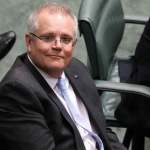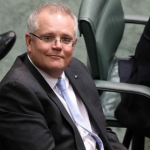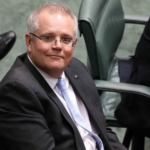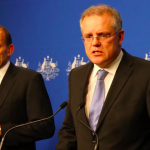“People of Faith Aren’t Being Discriminated Against”: An Interview With Father Rod Bower

In December 2017, literally days after marriage equality was passed, then treasurer Scott Morrison announced that he’d be pushing for laws in 2018 that prevented discrimination against Christians and those of other religious faiths.
“Where I think people are being offensive to religion in this country, whichever religion that might be, but particularly the one I and many other Christians subscribe to,” Mr Morrison told SMH, “we will just call it out and we will demand the same respect that people should provide to all religions.”
Twelve months later, Morrison, the newly-minted prime minister, asserted that his government would be drafting religious discrimination legislation, as well as creating the new position of religious freedoms commissioner.
Today, as the country awaits the introduction of the Religious Discrimination Bill, more than a few members of the Australian constituency are questioning why this issue has suddenly become of such national importance.
Religious exemptions
Just a week after the return of the Yes vote on same-sex marriage, then PM Malcolm Turnbull announced the establishment of a religious freedoms law review, so as to appease his conservative colleagues opposed to marriage equality, who are otherwise known as the religious right.
Ominously, the review was led by Philip Ruddock, the former Howard era attorney general, who actually introduced the 2004 amendment bill that made certain that same-sex marriage was outlawed in this country.
The Ruddock review recommendations were leaked to the press last October. And they drew public attention to already existing exemption laws that allow religious educational institutions to discriminate against teachers and students based on their sexuality.
After initially defending these religious exemptions as “existing law”, Morrison said he’d repeal the provisions relating to students. Although, he eventually threw the proposal to change these laws into the too hard basket.
An activist of the cloth
Father Rod Bower has been a vocal opponent of the government’s move to further embolden what many have referred to as religious privilege. The outspoken activist recently addressed a Community Action Against Homophobia rally in Sydney protesting the religious right to discriminate.
Known globally for his thought-provoking signs out the front of Gosford Anglican Church, Father Bower began his activism in 2013, after an incident where he thought his presence could have resulted in a dying man’s male partner experiencing marginalisation.
Sydney Criminal Lawyers spoke to Father Bower about what’s behind the push for further religious protection laws, the problems with legislating against religious discrimination, and his thoughts on whether exemption laws are ever justified.
Firstly, questions around religious freedoms have taken a prominent place in the current national debate. In your opinion, Father Bower, what’s behind this? And why is it such a priority for Canberra at present?
This religious freedom debate is being couched in somewhat deceptive terms, in that there’s a minority group – who are quite vocal – that are claiming some form of religious persecution.
I don’t believe it is true. The whole thing is being couched in a rather dishonest and disingenuous framework.
But, because they are quite vocal on the conservative side of the political spectrum – and because of the prime minister’s own particular religious proclivities – they do seem to have his ear. And that’s a cause of some concern.
That’s why they’re getting the attention that they have. And it’s certainly unrepresentative of the wider Christian community, and the wider faith community.
The Morrison government is about to introduce a Religious Discrimination Bill into parliament. You’ve raised concerns about this. What is problematic about legislating to stop discriminating against those of faith in the current setting?
First and foremost, people of faith aren’t being discriminated against. There’s no evidence of any sort of widespread discrimination against people of faith.
My concerns about this come from a firm belief that we all should live in the same civic universe. And when we don’t all live in the same civic universe, then human rights are in jeopardy.
We have laws that, generally speaking, restrict discrimination against people on the grounds of things they have no control over: age, gender, race, sexuality, disability. They are the categories of our anti-discrimination laws.
So, in order to discriminate against someone for something over which they have no control needs to be deeply considered, because all of a sudden, you excise those people from your civic universe. And that’s an abuse of human rights.
This is not the first time the religious freedoms debate has been raised in this country, or indeed, globally. Is what we’re seeing today an expression of what the religious freedoms debate has always been about, or is it being commandeered in a sense?
It’s being commandeered. This is being commandeered by the conservative Christian lobby. And there’s nothing about this debate that isn’t about sacking gay teachers from Christian schools, or expelling transgender or gender diverse students. That’s what it comes down to.
The International Covenant for Civil and Political Rights – which we are a signatory to – is very clear on this: that everybody has the right to hold a religious view of any description. But, our rights to manifest that view can be, under certain circumstances, restricted by law.
To discriminate against people on the grounds of sexuality is against the law. And I do not believe that your religious views should give you exemption from that.
You’ve just touched on this, but the release of the Ruddock review recommendations drew public attention to religious exemption laws.
These allow religious educational institutions to discriminate against employees and students based on sexuality. Are these provisions that already exist in law warranted in anyway?
I don’t believe that they are. And for several reasons. One is that it means people of diverse sexualities do not live in the same civic universe as I do. And that’s an abuse of human rights.
Secondly, we have very clear laws about anti-discrimination brought in by our parliament, and yet, public money is going to institutions that basically break those laws with impunity because of exemptions.
The Ruddock review allowed for that on the grounds that those schools and institutions make a very public statement in the prospectus on their website that people of diverse sexualities would be discriminated against. And if that legislation is to stand in its present state that’s a helpful safeguard. But, it’s still not ideal.
Thirdly, these are educational institutions funded by the public purse. There is no argument that education within a discriminatory framework is a healthy education. In fact, it’s very unhealthy. So, the government should not be funding educational frameworks that are not in the best interest of the student.
There have been suggestions that following the passing of the religious discrimination legislation that a situation like Israel Folau’s sacking would no longer be possible. Father Bower, what’s your point of view on the footballer losing his position over what he posted on social media?
Any institution or business has the right to employ people that don’t damage their brand. Rugby Australia has had a well-documented policy of inclusion, especially of diverse sexualities. And they had a highly paid employee who was damaging their brand.
Organisations do have the right not to employ people that will damage their brand.
Also, people of religious faith need to take responsibility for their faith and for whom they work. If you have a very discriminatory framework against people of a diverse sexuality, then why would you choose to work for an organisation that has a well-documented policy the opposite to that.
It’s like I can’t expect to work for the coal mining industry, because I have religiously-motivated views about climate change. And I need to take responsibility for that. So, I won’t work for the coal mining industry, as well as lots of other places I won’t work for because of my religious views.
The responsibility needs to be on the person of faith to make choices about where they work and where they don’t work, according to their religious framework.
You recently spoke at the Community Action Against Homophobia religious protections bill rally. And you made the statement “to be truly religiously free, is to be free of the need to discriminate”. Can you expand on that?
The ultimate goal of any faith system is to reach a sense of unity – or oneness – with the divine and with the entire creation. That is the goal of religious traditions.
To have the kind of attachments that lead you to exclude another human being is not the ultimate goal of any religious tradition. So, part of that faith journey is to be free of those attachments.
To be free of the need to discriminate is the ultimate goal of the journey for us all.
And lastly, given the position that we’re now in, with the federal government about to introduce these new laws, religious exemptions already being on the books, and at present, the government not looking like it’s set to remove them, how would you propose we move forward from here?
Certainly, there’s no prospect of those being removed. But, they shouldn’t be enhanced.
I support Ruddock’s recommendation that those institutions need to be very clear that they have a discriminatory framework in their employment and enrolment structure, in the case of a school.
And I would predict that if those institutions hold to that recommendation, then they’re one generation away from extinction.







